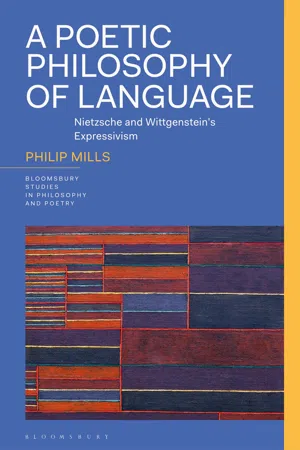
- 184 pages
- English
- PDF
- Available on iOS & Android
About this book
Connecting poetry and philosophy of language, Philip Mills bridges the continental and analytical divide by bringing together the writings of Nietzsche and Wittgenstein. Through an expressivist philosophy of poetry, he argues that we can understand some of the core questions in the philosophy of language.
Mills highlights the continuity of poetic language with ordinary language, and positions Nietzsche and Wittgenstein's thinking as the clearest way to expand the philosophy of poetry. By tracing the expressivist tradition of philosophy of language, this study locates its roots in German Romanticism right through to the work of contemporary expressivists such as Huw Price and Robert Brandom. Where poetry has been difficult to grasp with the traditional philosophical tools used by aestheticians, A Poetic Philosophy of Language operates at the crossroads between philosophy of art and language, proposing a new philosophy of poetry with wide-ranging potentialities.
Frequently asked questions
- Essential is ideal for learners and professionals who enjoy exploring a wide range of subjects. Access the Essential Library with 800,000+ trusted titles and best-sellers across business, personal growth, and the humanities. Includes unlimited reading time and Standard Read Aloud voice.
- Complete: Perfect for advanced learners and researchers needing full, unrestricted access. Unlock 1.4M+ books across hundreds of subjects, including academic and specialized titles. The Complete Plan also includes advanced features like Premium Read Aloud and Research Assistant.
Please note we cannot support devices running on iOS 13 and Android 7 or earlier. Learn more about using the app.
Information
Table of contents
- Half Title
- Series Page
- Title Page
- Copyright Page
- Contents
- Acknowledgements
- Abbreviations
- A tale of two divides: Towards a philosophy of poetry
- Chapter 1: Language, representation and metaphysics
- Chapter 2: German philosophy of language as Romantic Expressivism
- Chapter 3: Pragmatic Expressivism: Brandom, Price, Blackburn
- Chapter 4: From Wittgenstein to Nietzsche and back
- Chapter 5: Poetry after Nietzsche and Wittgenstein
- Chapter 6: Towards a perspectival poetics
- Conclusion: A poetic philosophy of language
- Notes
- Bibliography
- Index